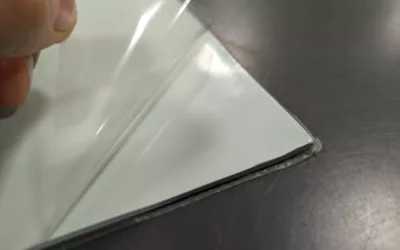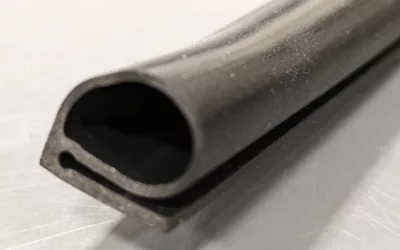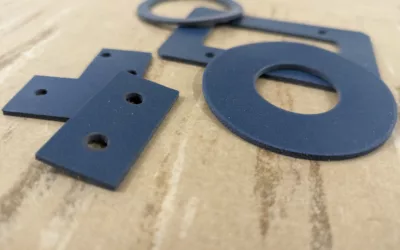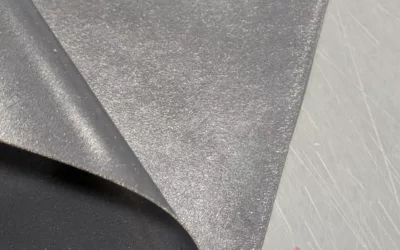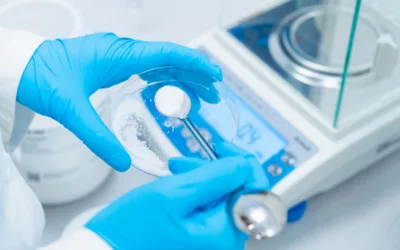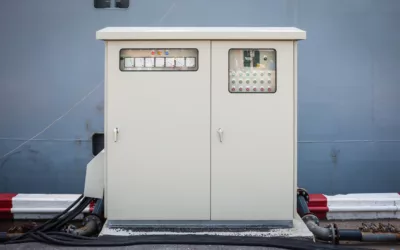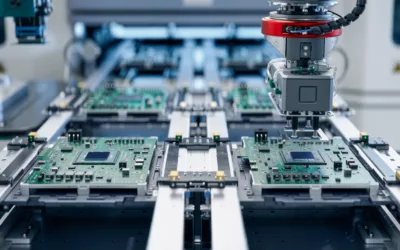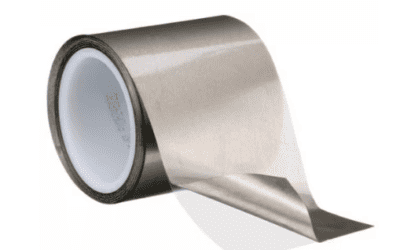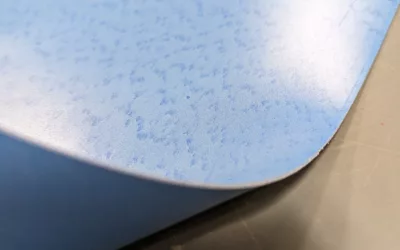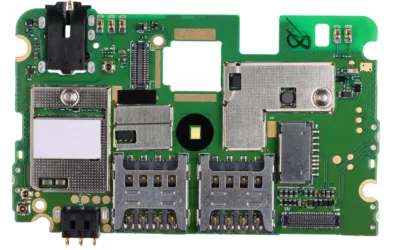Waterjet Cutting
Foam, Solid Gaskets, Thermal Pads, Absorbers, and Electrical Insulators
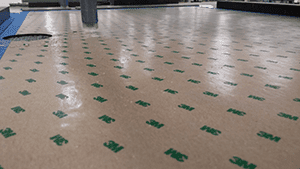
Waterjet Cutting PSA-backed Neoprene Gasket
NEDC operates only with state-of-the-art equipment that can handle a wide variety of materials. One of the most sophisticated machines NEDC owns is our Waterjet Cutters. Waterjet Cutting happens through a very unique process. The process starts with a high-powered pump that creates a lot of pressure for the water. The water then exits the head of the waterjet through a premounted sapphire/diamond orifice. All of this action produces an extremely powerful waterjet stream that is forced from the head at incredible speeds, (30,000-50,000psi). This streams pierces the gasketing material creating a clean cut with the most available commodity on the planet, water. The waterjet cutting process allows parts to be nested in a very economical fashion. NEDC is a leading waterjet cutting supplier for gaskets, insulators, and other elastomeric products such as thermal filler pads, or absorbers.
Foam/Sponge Gaskets:
Foam or Sponge gaskets are also cut with our waterjet machine. These materials can be flexible and cause issues in conventional die-cutting. This is due to the elastic nature of these materials; causing the material to snap-back into an hourglass like shape. However, with a waterjet focusing on one hole/feature/cut at a time, meeting tolerance requirements becomes easier.
Solid Rubber Gaskets:
At NEDC, the main function of our waterjet is used to cut solid gaskets. These gaskets can range from nitrile rubber, to neoprene rubber. The reason we do this is because typically when our customer is looking for a few gaskets, we can make them quickly and accurately on our waterjet. It also helps us dial in tight tolerances. Some of these materials include neoprene, fluorosilicone, silicone, nitrile, EPDM, or other conventional rubber materials.
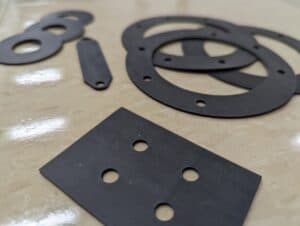
butyl custom gaskets
Advantages of a Waterjet Cutting Machine:
- Extremely Accurate Cuts of Complex Parts
Waterjet cutting offers an incredible amount of accuracy through a coordination of computer software and tight controls. Tolerance can be held as +/- .002” on some materials.
- Maximizes Yield of material through nesting software
Parts can be easily nested to offer our customer the best price possible. In some situations, when a part has a very unique geometry, sometimes the way it may be nested is not quite as linear as a simple horseshoe like part. In these cases, waterjet machines are able to flip, turn, and match the shape in many different directions utilizing every inch of material.
- No tool investment is necessary for water jet cutting
No tool is needed to be made, the DXF is the tool! Please provide an electronic file to aid in programming/cutting. This saves time and money because this file is cut to your specifications.
- Quick Prototypes
At NEDC, we strive to provide prototypes quickly. Waterjet Cutting offers the advantage of the customer being able to engineer the part through their DXF and see what the part will look like in production. The benefit of creating a DXF gives a side benefit of being able to move into production in a much quicker fashion by reducing the time between each prototype rendition. No tool is required to be created, so parts can be cut extremely fast.
- Cut parts from CAD/DXF files, to ensure perfect accuracy of every cut, every time. High degree of repeatability
The DXF is executed by the software in the waterjet cutting machine. When cutting with a DXF file, you can guarantee that no tool will wear/abrade. The waterjet stream itself is always offering a consistent water stream that makes each part nearly identical to the last. This makes reproducibility a huge asset for the machine.
- Allows materials to be cut without the typical compression of conventional die-cutting
Die-Cutting thick foam/sponge materials can result in concavity because of the “burst” action of the die; with a waterjet it is possible to avoid this compression distortion because the waterjet is not compressing the material in the way a conventional die cutting operation would. The difference is, it is slicing through the material in a vertical direction.
- Size of gaskets/parts has little limitations
Cutting gaskets has nearly no limitations when it comes to custom. However, size becomes a concern the bigger the gasket becomes. With waterjet cutting, the only limitation becomes the size of the bed of the waterjet itself. With that said, NEDC has cut 7 foot gaskets before on its waterjet machine.
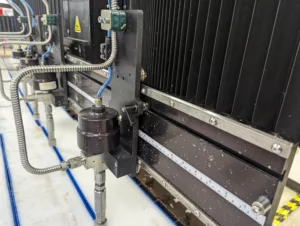
waterjet cut sponge/foams
Limitations of a Waterjet Cutting Machine:
- Size of parts have limitations
While we just said above that bigger gaskets are easier to cut with a waterjet- as it gets smaller, it may become more difficult. This is because the waterjet stream has a size too, and that starts to limit the features it can cut with accuracy. If the stream and the feature become competitive in size, it can become a challenge.
- Amount of parts being cut
While waterjet cutting is pretty quick, the amount of parts being cut can become a challenge because as mentioned above, cutting with a waterjet only works on one feature at a time. This is in comparison to die-cutting that cuts everything all at once. This is one of the tradeoffs when using a waterjet cutting machine. This drawback generally falls under speed of the overall process.
- Some materials just do not work
Some materials just do not cut well on a waterjet. Fibrous, or otherwise paper like products generally have a tough time cutting because either they soak up the water or they explode when cutting them. Other materials that we know do not work is anything that is impregnanted with wire in a perpendicular direction to the material. It is wise to consult with an experienced waterjet operator before asking a part to be waterjet.
If you have a gasket/part that you believe could be waterjet cut, please send your question or drawing to sales@nedc.com. NEDC has experienced waterjet operators that understand what the machine can do well.
Waterjet Cutting Blog
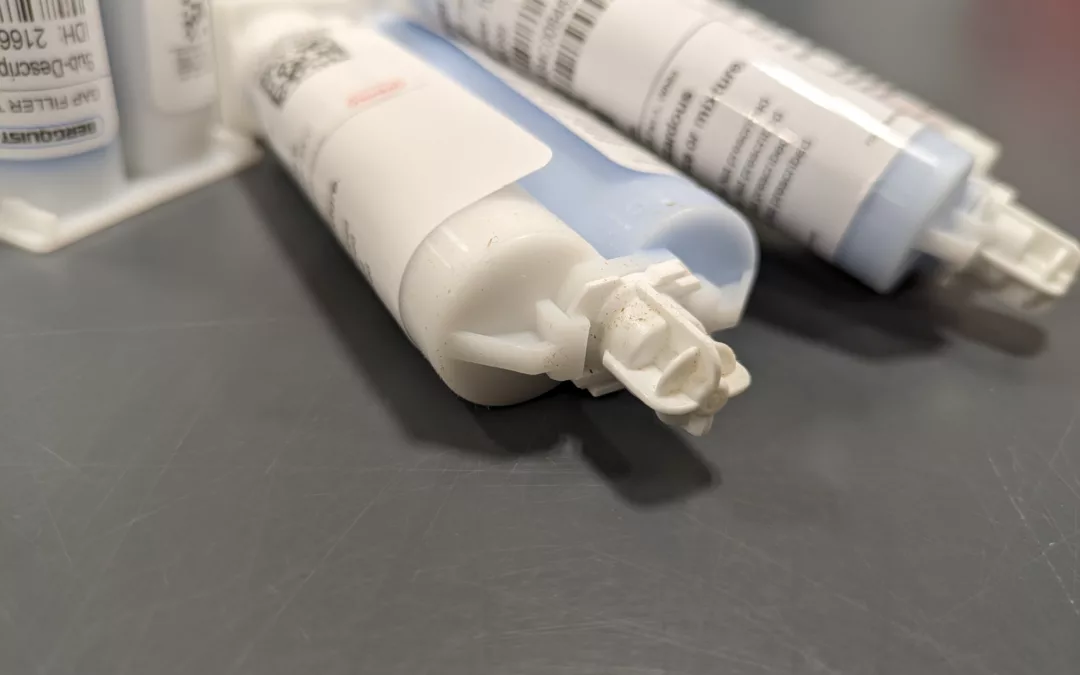
Thermal Gap Filler | NEDC distributes TGF 3600/GF3500S35 | Information
At NEDC, some say we are experts in thermal gap pads. We are also experts in liquid gap filler materials. So much in fact, we actually distribute both. One of the materials we like a lot, and will be highlighted in an upcoming video is TGF 3600, or...
Previous Posts
NEDC Launches Video Demonstrating How Thermal Pads Work!
<iframe width="1519" height="526"...
NEDC Introduces First Thermal Pad Experiment Video
This video shows how a thermal pad actually works with the analogy of...
Are Electrically Conductive Gaskets, Thermally Conductive ? | A Test Analysis
Recently, we procured a thermal performance testing machine. I thought...
Thin Gasketing Options | .015”, & Below | High Performance Gaskets
Applications get smaller, and smaller everyday. As footprints of the electronics we serve get thinner, and lighter i.e electronic signs, tablets, and other peripherals, the gasketing must get thinner to accommodate it. We have customers come in all the time looking...
T-Global Technology | Thermal Gap Pads | Thick, Thin, High W/m-K
At NEDC, thermal pads are our specialty. Our manufacturing site is in Methuen, MA. Across the pond, in the United Kingdom, there is a reputable thermal pad manufacturer. This manufacturer is called T-Global Technology. They make a number of thermal interface...
EMI/RFI Bulb/Hollow Gaskets – The Softest EMI/RFI Gasket
At NEDC, we mostly die-cut, knife-cut, or waterjet cut gaskets. However, we do also fabricate, glue, or bond together some gaskets. Why do we do this? The short answer is because we cannot die cut, or waterjet cut them. However, sometimes it's also for performance...
Low Durometer/Soft EMI/RFI Gaskets – 30A, 40A, 50A Gasketing
For years, NEDC has supplied low durometer gasketing materials to customers. One product that I realized has been underutilized the last few years is “low durometer EMI Gasketing”. On this website, we are making a large push to show we are a gasket manufacturer who...
Nickel Coated Aluminum Gaskets | EMI Gaskets | Corrosion Resistant Gaskets
EMI Gaskets are not a new technology. They have been around for the last 60 years. However, once in a while a new technology emerges for a different type of foam, or a different type of orientation of materials. Over the last few years, a new type of particle has...
Applications: Scanner, PDDs, Analyzers – Gaskets, Pads, Thermal Pads
At NEDC, we manufacture an incredible array of applications. In today's blog, I thought I’d talk about something we’ve all interacted with at some point. In today's world, we are trying to have the data at our fingerprints all the time. Some of these mobile devices...
Silicone Rubber Gasketing, Peroxide vs. Platinum Cured
Customers buy all sorts of silicone rubber gaskets. In fact, silicone rubber gasketing materials are some of our most popular materials we sell to customers. Of course, theres all sorts of silicone rubber materials. Customers sometimes ask if one is better than the...
Why Commercial EMI/RFI Gasketing | Custom Die-Cut EMI Gaskets
At NEDC, we sell gaskets, lots of them. I would love nothing better than to sell a fully loaded pure silver gasket. Love it. However, I’ll be honest, I don’t think that's necessary most times. When customers have all the money in the world to spend, sometimes I wish...
LOCTITE® Thermstrate 2000 aka TCF 1000AL | Die-Cutting/Converting
At this point, I’ve written 250 blogs on this website- I know, I am even like, how much of a thermal pad geek am I? Why did I ask this question? I was curious if I have written a blog about LOCTITE® Thermstate 2000 Phase Change material. At one point, we had written a...
Long Shelf Life Electrically Conductive Single/Double | EMI Shielding Tapes
We are a 3M converter, and if I’m being honest, I don’t throw a party everytime they come out with a new product. I like new copper foil products, and new VHB Tapes just like the next guy, but nothing gets me going like: “LONGER SHELF LIFE ELECTRICALLY CONDUCTIVE...
Pure EMI Silver Gaskets, Are They Needed?
Customers ask me for material selection recommendations all the time. One way I believe I build trust with clients is, I don’t upsell things I don’t need to. Customers literally once a week call and say, I NEED VITON! Oftentimes my response is “Hey, I’ll sell you...
Can you use a Thermal Pad/Gap Pad more than Once?
My blogs largely originated from the various questions I have gotten from customers over the years. This includes the most popular ones. One question I realized I get an awful lot is : “Are Gap Pads Reusable?” Heres my short answer, “It depends, but I wouldn’t ever”....
All of the information presented above is believed to be factual and accurate; however, NEDC is not liable for any design or application utilizing this information.
New England Die Cutting
Capabilities/Products
Quick Links
Popular Blog Posts
NEDC Introduces First Thermal Pad Experiment Video
This video shows how a thermal pad actually works with the analogy of cooking.
Frozen Epoxy Films in Stock at NEDC!
NEDC is a converter of frozen epoxy films to make custom preforms for customers to buy. For that reason, NEDC has many frozen films in stock. These include: Ablefilm 5025E Ablefilm 561K Ablefilm CF3350 Ablefilm 566K And others. We wanted to just get it out there on...
Pure EMI Silver Gaskets, Are They Needed?
Customers ask me for material selection recommendations all the time. One way I believe I build trust with clients is, I don’t upsell things I don’t need to. Customers literally once a week call and say, I NEED VITON! Oftentimes my response is “Hey, I’ll sell you...
